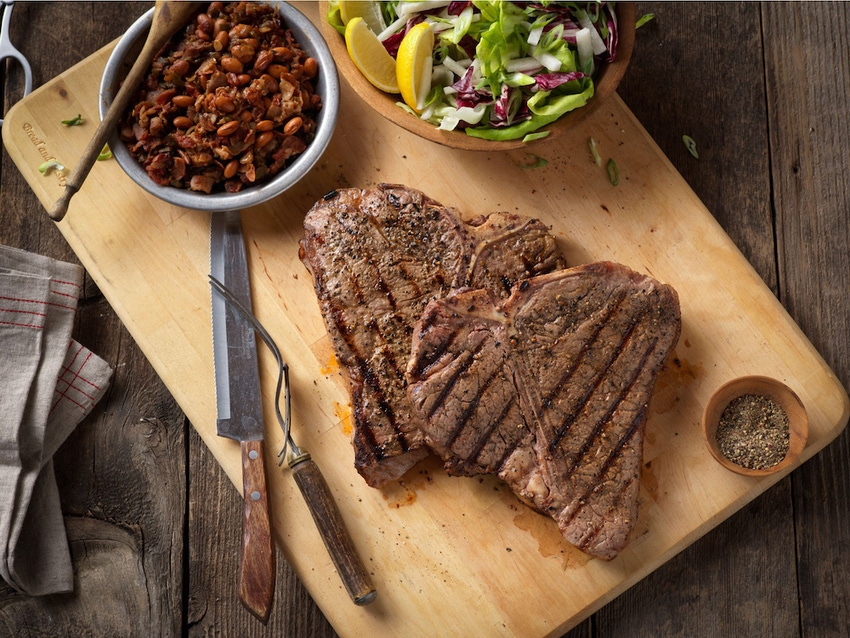Big Four meatpackers accused of conspiring to inflate beef prices
Meatpackers headed to court facing accusations of conspiring to inflate beef prices through a scheme that came to light during pandemic-related meat shortages.
June 14, 2020

The 2020 train keeps on moving down the tracks, and even though it’s been a rocky ride, the wheels keep spinning forward.
Despite a pandemic, riots, an economic shutdown and a political chess match that continues to unfold as the U.S. presidential election draws near, it’s business as usual back home on the ranch. No shutdowns, no sheltering in place, just working to raise the best beef possible while dealing with a crazy set of circumstances outside of our control.
And during this time, eyes have been on the final segment of the beef industry chain — our nation’s largest meatpackers.
Earlier this year, as COVID-19 swept across the nation and outbreaks forced plants to slow production, President Trump ordered these facilities to remain open, using the Defense Production Act to ensure meat remained on grocery store shelves during this national emergency.
In April, President Trump also called for an investigation for potential anticompetitive behavior in the beef packing industry.
READ: NCBA, Sen. Deb Fischer call for investigation
In May, we saw packing plants make adjustments to safely bring employees back to work while minimizing risks during this global outbreak of COVID-19.
READ: Is it possible to safely run meat plants during pandemic?
Then, we saw heated discussions and passionate calls for action from every side of the coin on topics like the fragility of our food system, selling beef locally, the Prime Act, mandatory country-of-origin labeling (MCOOL), environmental extremists, animal rights activists and corruption in the meat business.
READ: South Dakota rancher tackles hot topics over coffee
In early June, the Department of Justice sent civil investigative demands to Tyson, JBS, Cargill and National Beef to formally look at potential antitrust violations.
READ: DOJ subpoenas meatpackers
Following this news, we also learned that Pilgrim’s Pride and Claxton Poultry Farms had been accused of price fixing. And we’ve also seen how activist groups have pushed to transition slaughterhouses from harvesting cattle to cooking up faux plant-based patties instead.
READ: Packers under investigation; What’s the implications for us?
That’s a ton of news to digest in just a few months. What else could be happening in the meat space?
For starters, the Big Four will need to reconcile with accusations of conspiring to price fix during the pandemic, and even before.
According to Bloomberg Law, “Cargill Inc., JBS USA, National Beef Packing Co., and Tyson Foods were accused in Minneapolis federal court of conspiring to inflate the price of beef through an industrywide scheme that’s coming to light thanks to federal investigations prompted in part by shortages during the coronavirus pandemic.
“The proposed class action accuses the four meatpacking giants, which together control more than 80% of the industry, of leveraging their ‘gatekeeping’ role atop the concentrated, inelastic wholesale market ‘to collusively control both upstream and downstream beef pricing.’
“Before 2015, cattle and beef prices ‘predictably moved in tandem,’ given that ‘beef is simply processed cattle,’ according to the complaint. But the meatpackers allegedly conspired starting that year to widen the ‘meat margin’—the spread between what they paid for cattle and what they got for beef—to ‘unprecedented’ levels by reducing purchases and running their plants at below capacity.”
These are pretty heavy allegations, and if true, the impacts on the beef industry will likely be far-reaching and widely felt.
Additionally in the news, last week USDA Secretary Sonny Perdue released a statement applauding the reopening of meatpacking facilities across the United States.
According to a USDA press release, “As of this June 9, across the cattle, swine, and broiler sectors, processing facilities are operating more than 95% of their average capacity compared to this time last year. In fact, beef facilities are operating at 98%, pork facilities are operating at 95%, and poultry facilities are operating at 98% of their capacity compared to the same time last year.
“America’s meatpacking facilities are safely resuming operations following President Trump’s Executive Order directing the facilities to implement the Centers for Disease Control and Prevention (CDC) and the Department of Labor’s Occupational Safety and Health Administration (OSHA) guidelines specifically created for the meat and poultry sector response to the COVID-19 pandemic. The USDA in conjunction with the CDC, OSHA, and state and local health officials, have been working around the clock to ensure a safe and stable supply of protein is available for American consumers all while keeping employees safe.
“‘President Trump took decisive action to ensure America’s meatpacking facilities reopen in a safe way to ensure America’s producers and ranchers will be able to bring their product to market,’ said Secretary Perdue. ‘I want to thank the patriotic and heroic meatpacking facility workers, the companies, and the local authorities for quickly getting their operations back up and running, and for providing a great meat selection once again to the millions of Americans who depend on them for food.’”
I’ll continue to provide updates on the meatpackers as investigation results unfold. Stay tuned.
The opinions of Amanda Radke are not necessarily those of beefmagazine.com or Farm Progress.
About the Author(s)
You May Also Like




.png?width=300&auto=webp&quality=80&disable=upscale)
